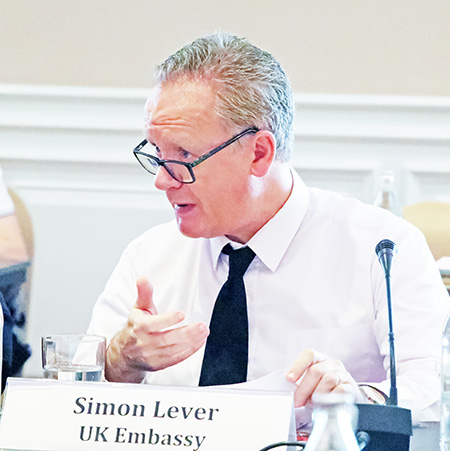British Embassy Bangkok and UN Women host dialogue on conflict-related sexual violence survivors and children born out of rape
In Bangkok, British Embassy Bangkok and UN Women in Asia Pacific held talks to develop strategies to respond to the needs of survivors and to prioritise their well-being and securityDate:
Bangkok, Thailand — British Embassy Bangkok and UN Women in Asia Pacific hosted a dialogue on ‘Addressing the needs of sexual violence survivors and children born out of rape in National Action Plans for Women, Peace and Security in Asia-Pacific’ in Bangkok on 12 January 2017.
The event brought together global and regional experts, civil society, and representatives from UN entities involved in the development of National Action Plans for Women, Peace and Security (NAPs-WPS) to develop strategies to respond to the needs of survivors and to prioritize their well-being and security.

British Embassy Bangkok’s Political Counsellor, Simon Lever, gave opening remarks to underline the UK’s commitment to preventing conflict-related sexual violence.
He emphasized that: "The stigma associated with sexual violence can ostracize survivors from their communities and families, deny them access to justice, and cut them off from support networks."
He highlighted that: "The UK will continue to push for high-level international attention to addressing the causes and consequences of sexual violence, and that tackling stigma will continue to be a top priority over the coming years."
UN Women Regional Adviser for Governance, Peace and Security, Hanny Cueva-Beteta, stressed that: "In order to effectively counter stigma against survivors, we must ensure that responses reflect the cultural, social and religious realities of how stigma operates within each context."
Expert participants reflected on the needs of survivors in Nepal, Indonesia, the Philippines, Timor-Leste, Sri Lanka and Myanmar, and identified priorities for action. These included the need for collaborative approaches between Government, civil society, service providers, the media, and faith and community organizations as key actors in delivering holistic responses to survivors. Experts also considered that NAPs-WPS and other policy frameworks and mechanisms should promote a multi-sectoral approach to working with survivors that deliver health and psychosocial support, economic opportunities, and safety and security measures.
The discussions and recommendations of the expert group meeting will be reflected in the final report, with the next event to be organised in March 2017.
In July 2016, UN Women and the Government of Japan hosted an Asia-Pacific Regional Symposium on the National Action Plans (NAPs) on Women, Peace and Security (WPS) in Bangkok with over 80 participants from 17 countries to examine the successes and challenges of NAPs-WPS in Asia-Pacific to date. Following the successful symposium, the UK funded this follow up project as part of the wider UK-Japan cooperation on gender in security and conflict.